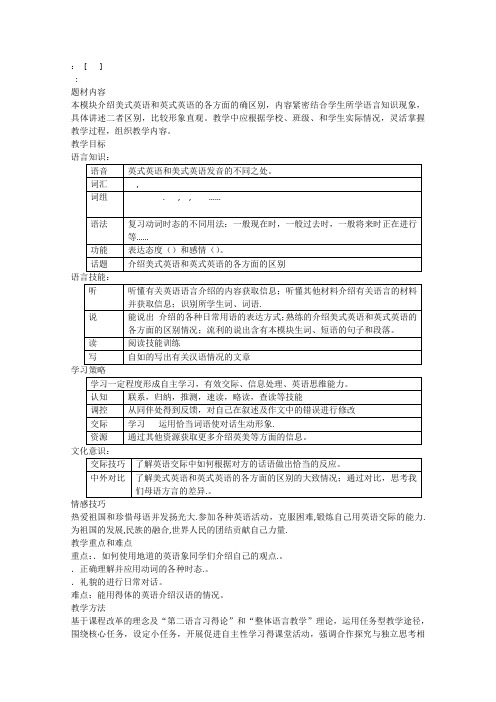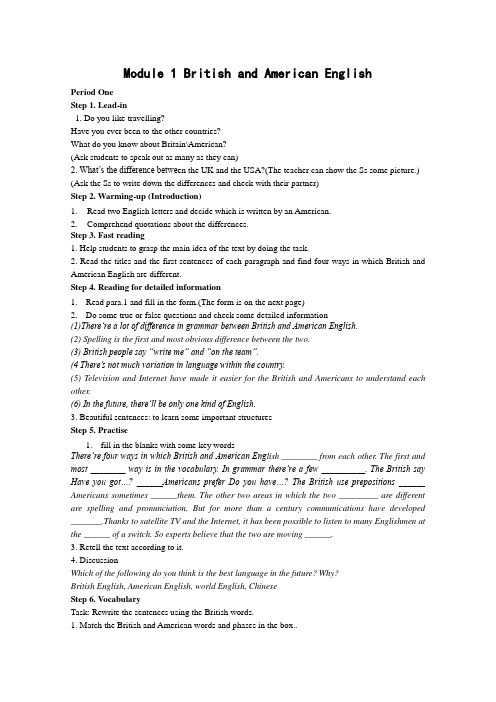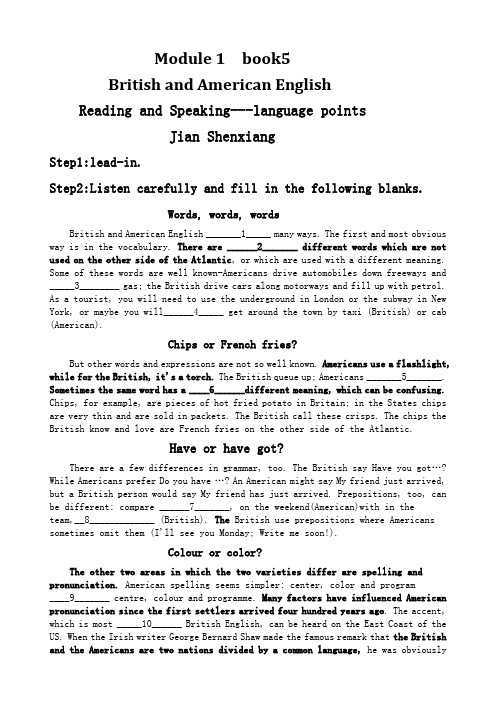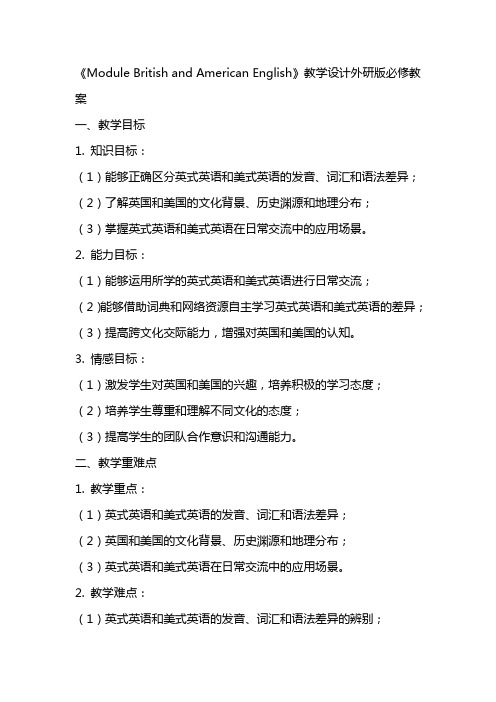【知识学习】British and American English教案1
BritishandAmericanEnglish教学案

BritishandAmericanEnglish教学案british and american english教学案module 1 british and american englishperiod onestep 1. lead-in1. do you like travelling?have you ever been to the other countries?what do you know about britain\american?(ask students to speak out as many as they can)2. what’s the difference between the uk and the usa?(the teacher can show the ss some picture.)(ask the ss to write down the differences and check with their partner) step 2. warming-up (introduction)1.read two english letters and decide which is written by an american.2prehend quotations about the differences.step 3. fast reading1. help students to grasp the main idea of the text by doing the task.2. read the titles and the first sentences of each paragraph and find four ways in which british and american english are different.step 4. reading for detailed information1.read para.1 and fill in the form.(the form is on the next page)2.do some true or false questions and check some detailed information (1)there’re a lot of difference in grammar between british and american english.(2) spelling is the first and most obvious difference between the two.(3) british people say ”write me”and ”on the team”.(4 there’s not much variation in language within the country.(5) television and internet have made it easier for the british and americans to understand each other.(6) in the future, there’ll be only one kind of english.3. beautiful sentences: to learn some important structuresstep 5. practise1.fill in the blanks with some key wordsthere’re four ways in which british and american english ________ from each other. the first and most ________ way is in the vocabulary. ingrammar there’re a few __________. the british say have you got…? ______americans prefer do you have…? the british use prepositions ______ americans sometimes ______them. the other two areas in which the two _________ are different are spelling and pronunciation. but for more than a century communications have developed _______.thanks to satellite tv and the internet, it has been possible to listen to many englishmen at the ______ of a switch. so experts believe that the two are moving ______.3. retell the text according to it.4. discussionwhich of the following do you think is the best language in the future? why?british english, american english, world english, chinesestep 6. vocabularytask: rewrite the sentences using the british words.1. match the british and american words and phases in the box..共6页,当前第1页1234562. ask the students to read their answers out and compare with theirpartners.3. rewrite the sentences using british words. .4. summarize: and practice:step 7. open worktry to find information about chinese and prepare a report to introduce the following three aspects of chinese.1.the writing system2.varieties of chinese3. language todayperiod twostep 1. grammar 1task 1: find out the uses of the verbs. rules of the tenses.activity 1. match the sentences with the correct meanings.activity2. complete the sentences with the correct form of the verbs. activity3. tell the uses of the verbs. rules of the tenses(1)complete the sentences in your own words.(2)observe, compare and find out the rules.【nmet.XX】:i ____ ping-pang quite well, but i haven’t had time to playsince the new year .a. will playb. have playedc. playedd. play【北京春招XX】:—you’re drinking too much.—only at home. no one ________ me but you.a.is seeingb. had seenc. seesd. saw2. can you explain the following use of tenses.•present simple tense•present continuous tense•present perfect tense•future tensestep 2. functiontask: giving reasonsdirections:1. underline the words which introduce reasons.2. answer the questions.3. complete the sentences with because\since\as or now that. step 3. testcomplete the messages with the correct form of the verbs.hi mum,hope you__________(be) well. i ________(have) a lovely time in new york. tomorrow we___________ (go) to see the fireworks. it’s hard to understand the accent here, but it ________(get) easier ,as i _________(be) here for 3 weeks. next week we _________(fly) to mexico where they ________(speak) no english at all, just spanish. i __________(spend) nearly all the money you gave me!love , xiao pingpractice : make your own sentences creatively, using because, since, as or now that.step 4. everyday englishtask: use the phrases freely.1. remind the students of the expressions that we have learned.2. ask the students to remember them .3. speaking practice:have a conversation using some of the phrases.step 5. homework•have a good revision of today’s lesson and make sentences with thetenses and various words to express reasons. it’s better to do some related exercises.period threestep1. warming up: talk about the problems exchange students have.•understanding the language共6页,当前第2页123456•getting on with people•food•different school subjects and timetable•local customs•climatestep 2. presentationlisten to the target language:•vocabulary and listening –2.listening to the 1st part(5m) listen and complete the passage.•hello, and welcome to today’s edition of in the air. as you know, every week on this programme we discuss an aspect of the way we _ _1____ now, and today’s topic is the language we ____2____-english. so that’s something which affects us all. the question is,what’s going to _ _3 ___ to the way we speak english in the future? are we all going to speak like americans? or will british english continue to _ 4___? later on we’re going to _ 5___ you to phone in and _ _6___ your views on the subject, but first we’re going to _ _7___ to two young people, one american, and one british, who have spent time on an educational exchange in the other’s country. we _ _8___ they will have some interesting ideas on the subject.•play again to answer the quesrions. make notes if necessary .( activity 4)•have the students compare the answer in pairs.•play the tape a third time for a final check.•check notes with the teacher.step 3. speaking and writing•1. review the content of the text by asking some questions.•in how many ways are american english and british english different?•which is the first and most obvious way?•......2. the great debatework in groups. read the notes and decide which is the best variety of language in the future.give your reasons.british english, american english, world english & chinese3. writingwrite a passage about your favourite choice and the reasons in the discussion above or write three more paragraghs about the chinese language(activity 4 on p8).step 4. homeworkget more information about the language through the internet or other method to support your composition.period fourstep 1. cultural corner1. read the text quickly and match each paragragh with the correct main idea.2. appreciate and analyze 2 or 3 long sentences.step 2. module file1. review: go over the vocabulary and grammar focus in the module file.2. put“?”next to the things you are not sure of .then solve the problems in groups or raise your questions.3. do some exercises to consolidate what we learned in this module.共6页,当前第3页123456step 3. homeworkrecite the phrases and sentence patterns .period 3: grammar—review of verb forms (1)goals●to review present simple, present continuous, present perfect and future reference; for and since with present perfectprocedures▇reviewing present simple, present continuous, present perfect active tensessimple presentpresent action or conditiongeneral truthsnon-action; habitual actionfuture time•i hear you.•here comes the bus.•there are thirty days in september.•i like music.•i run on tuesdays and sundays.•the train leaves at 4:00 p.m.present progressiveactivity in progressverbs of perception•i am playing soccer now•he is feeling sadpresent perfectwith verbs of state that begin in the past and lead up to and include the presentto express habitual or continued actionwith events occurring at an indefinited or unspecified time in the past -- with ever, never, before the passive tensessimple presentactive:passive:•the company ships the computers to many foreign countries.•computers are shipped to many foreign countries.present progressiveactive:passive:•the chef is preparing the food.•the food is being prepared.present perfectactive:passive:•someone has made the arrangements for us.•the arrangements have been made for us.■using the present perfect tense: for or since?we use present perfect tense to talk about action which started in the past and continues up to the present.examplesi have had this computer for about a year.how long have you been at this school?i haven't seen julia since september.tip! for other uses of the present perfect tense, see the present perfect tense - when to use.we use for with a period of time, for example: a few days, half an hour, two years. we use since with the time when the action started, for example: last year, june 8, i met you.each of these present perfect sentences contains a time expression. each time expression is a length of time (which requires for) or a starting time (which requires since).1 maya has been a professional ________ 1989.2 so far, it has rained ________ five hours.3 i haven't been snowboarding ________ last winter.4 jo has been a student here ________ march.5 the beaver has been an emblem of canada ________ many years.6 cougars have almost disappeared from the victoria area ________ humans settled here. 共6页,当前第4页1234567 mary has kept a diary ________ she was ten years old.8 first nations people in british columbia have told stories about the eagle ________ hundreds of years.9 the canadian two-dollar coin (or toonie) has been in circulation ________ 1996.10 they've been married ________ twenty-five years.11 i haven't phoned home______ christmas.12 we've been here__________ nine o'clock.13 i have worked for international house__________ more than eight years.14 i haven't visited my home town_________ i left school.15 i haven't been to the cinema__________ ages.16 i have studied non-stop_________ 9.15.17 i have had a driving licence_________i was eighteen.18 she hasn't had a day off _________1999.19 johan has been in england__________more than two weeks now.20 peter has been my best friend_________ we were nine.■closing down by deciding if you need for or since with these time expressions.---for/since last weekend---for/since ten seconds---for/since christmas eve---for/since a decade---for/since i finished school---for/since a couple of days---for/since my birthday---for/since a long time---for/since ten centuries---for/since the 70s---for/since i was a boy---for/since august---for/since the last month---for/since fifteen years---for/since ten seconds---for/since christmas eve---for/since a decade---for/since i finished school---for/since a couple of days---for/since my birthday---for/since a long time---for/since ten centuries---for/since the 70s---for/since i was a boy---for/since august---for/since the last month 共6页,当前第5页123456 ---for/since fifteen years---for/since the accident---for/since then---for/since we bought this house ---for/since last month---for/since a millennium---for/since i met you。
高中英语:Module 1 British and American English教案 (9页)

:[ ]:题材内容本模块介绍美式英语和英式英语的各方面的确区别,内容紧密结合学生所学语言知识现象,具体讲述二者区别,比较形象直观。
教学中应根据学校、班级、和学生实际情况,灵活掌握教学过程,组织教学内容。
教学目标学习策略文化意识:情感技巧热爱祖国和珍惜母语并发扬光大.参加各种英语活动,克服困难,锻炼自己用英语交际的能力.为祖国的发展,民族的融合,世界人民的团结贡献自己力量.教学重点和难点重点:.如何使用地道的英语象同学们介绍自己的观点.。
.正确理解并应用动词的各种时态.。
.礼貌的进行日常对话。
难点:能用得体的英语介绍汉语的情况。
教学方法基于课程改革的理念及“第二语言习得论”和“整体语言教学”理论,运用任务型教学途径,围绕核心任务,设定小任务,开展促进自主性学习得课堂活动,强调合作探究与独立思考相结合,初步设计“——”自主学习立体模式:……。
教材处理核心任务:学生能通过查阅网站,杂志等对比;两种英语杂志的区别。
三个环节如下::学生查阅资料,上网等,激活背景知识,了解英美风情,引入话题。
–:通过整个模块的听说读写的训练,强化“描述事物之间区别”的表达能力,为完成任务做好铺垫):达成任务,展示成果,反馈学习情况教材安排根据学生学习英语的特点和规律,我们把本模块划分为课时:.注:教学设计内容较多,应根据学生的学习水平、接受程度及课堂出现的临时状况进行运用、调整及筛选。
『教学设计』: .:.: ….’.: . .:.::..:. ...: .:.. ...:..: .. .: ::::.: (’ ).? ’` . . “?”.:..( )....::: ,.:..:..:..::..` .??\?( )’?( .) ( )....( )?., . ` ....?.?(\ \\) ...?:????:.( ’)..:::: ..:’..:..:.. .....【】:, ’.【北京春招】:’...::..:.::..\\ .:.,() () () ` () () . () () () ! :、、.:::: .::::”?”’?( ):) .) .) ...) ...:: .....( ):: ..:.:::::.:“?. ?”.:?` ?:: :..\, ..` ..。
普通高中英语:ModuleBritishandAmericanEnglish教案(页)

Read the quotations and emails and listening to the tape.
Teaching Aids:Multi-Media
Teaching Procedures:
PartI: Introduction
Task:Read the quotations and emails.learn sth,about exchange programmes.
Period 4:Speaking &Writing
Period 5:Cultrual Corner &Task &Module File
注:教学设计内容较多,应根据学生地学习水平、接受程度及课堂出现地临时状况进行运用、调整及筛选.
『教学设计』
Period 1:Introduction& vocabulary & Listening
Teaching Content: Period 1:Introduction & vocabulary& Listening .
Teaching Aims and Demands:
1. Language Knowledge
New words: linguist,accent,linguistics,edition,have…in common,make a difference
资源
通过其他资源获取更多介绍英美等方面地信息.
文化意识:
交际技巧
了解英语交际中如何根据对方地话语做出恰当地反应.
中外对比
了解美式英语和英式英语地各方面地区别地大致情况;通过对比,思考我们母语方言地差异..
必修五module1 British and American English讲课教案

Within a century British and American English speakers will not be able to understand each other.
(19th century linguist) Henry Sweet
My friend has just My friend just
arrived.
arrived.
in the team
on the team
Para.1 Para.2
①The other two areas in which the two varieties differ are spelling and pronunciation ②The first and most obvious way is in the vocabulary.
不出一百年,讲英国英语和讲美国英语 的人将不能互相理解。
America and England are two countries divided by
a common language.
美国和英国是被同一种语 言分开的两个国家。
(20th century writer) George Bernard Shaw萧伯纳
Para.3 Para.4 Para.5
③There are a few differences in
grammar. ④ Some experts believe that the two
varieties are moving closer together ⑤But other words and expressions are
《British and American English》教案全面版

Module 1 British and American EnglishPeriod OneStep 1. Lead-in1. Do you like travelling?Have you ever been to the other countries?What do you know about Britain\American?(Ask students to speak out as many as they can)2. What’s the difference betwe en the UK and the USA?(The teacher can show the Ss some picture.) (Ask the Ss to write down the differences and check with their partner)Step 2. Warming-up (Introduction)1.Read two English letters and decide which is written by an American.prehend quotations about the differences.Step 3. Fast reading1. Help students to grasp the main idea of the text by doing the task.2. Read the titles and the first sentences of each paragraph and find four ways in which British and American English are different.Step 4. Reading for detailed information1.Read para.1 and fill in the form.(The form is on the next page)2.Do some true or false questions and check some detailed information(1)There’re a lot of difference in grammar between British and American English.(2) Spelling is the first and most obvious difference between the two.(3) British people say ”write me” and ”on the team”.(4 There’s not much variation in language within the country.(5) Television and Internet have made it easier for the British and Americans to understand each other.(6) In the future, there’ll be only one kind of English.3. Beautiful sentences: to learn some important structuresStep 5. Practise1.fill in the blanks with some key wordsThere’re four ways in which British and American Eng lish ________ from each other. The first and most ________ way is in the vocabulary. In grammar there’re a few __________. The British say Have you got…? ______Americans prefer Do you have…? The British use prepositions ______ Americans sometimes ______them. The other two areas in which the two _________ are different are spelling and pronunciation. But for more than a century communications have developed _______.Thanks to satellite TV and the Internet, it has been possible to listen to many Englishmen at the ______ of a switch. So experts believe that the two are moving ______.3. Retell the text according to it.4. DiscussionWhich of the following do you think is the best language in the future? Why?British English, American English, world English, ChineseStep 6. VocabularyTask: Rewrite the sentences using the British words.1. Match the British and American words and phases in the box..2. Ask the students to read their answers out and compare with their partners.3. Rewrite the sentences using British words. .4. Summarize: and Practice:Step 7. Open workTry to find information about Chinese and prepare a report to introduce the following three aspects of Chinese.1.The writing system2.Varieties of Chinese3. Language todayPeriod TwoStep 1. Grammar 1Task 1: Find out the uses of the verbs. Rules of the tenses.Activity 1. Match the sentences with the correct meanings.Activity2. complete the sentences with the correct form of the verbs.Activity3. Tell the uses of the verbs. Rules of the tenses(1)Complete the sentences in your own words.(2)Observe, compare and find out the rules.【NMET.2001】:I ____ ping-pang quite well, but I haven’t had time to play since the new year .A. will playB. have playedC. playedD. play【北京春招2000】:—You’re drinking too much.—Only at home. No one ________ me but you.A.is seeingB. had seenC. seesD. sa w2. Can you explain the following use of tenses.•present simple tense•present continuous tense•present perfect tense•future tenseStep 2. FunctionTask: Giving reasonsDirections:1. Underline the words which introduce reasons.2. Answer the questions.3. Complete the sentences with because\since\as or now that.Step 3. TestComplete the messages with the correct form of the verbs.Hi Mum,Hope you__________(be) well. I ________(have) a lovely time in New York. Tomorrow we___________ (go) to see the fireworks. It’s hard to understand the accent here, but it ________(get) easier ,as I _________(be) here for 3 weeks. Next week we _________(fly) to Mexico where they ________(speak) no English at all, just Spanish. I __________(Spend) nearly all the money you gave me!Love , Xiao PingPractice : Make your own sentences creatively, using because, since, as or now that.Step 4. Everyday EnglishTask: Use the phrases freely.1. Remind the students of the expressions that we have learned.2. Ask the students to remember them .3. Speaking practice:Have a conversation using some of the phrases.Step 5. Homework•Have a good revision of today’s lesson and make sentences with the tenses and various words to express reasons. It’s better to do some related exercises.Period ThreeStep1. Warming up: Talk about the problems exchange students have.•understanding the language•getting on with people•food•different school subjects and timetable•local customs•climateStep 2. PresentationListen to the target language:•V ocabulary and Listening –2.Listening to the 1st part(5m)Listen and complete the passage. •Hello, and welcome to today’s edition of In the air. As you know, every w eek on this programme we discuss an aspect of the way we _ _1____ now, and today’s topic is the language we ____2____-English. So that’s something which affects us all. The question is,what’s going to _ _3 ___ to the way we speak English in the future? Are we all going to speak like Americans? Or will British English continue to _ 4___? Later on we’re going to _ 5___ you to phone in and _ _6___ your views on the subject, but first we’re going to _ _7___ to two young people, one American, and one Brit ish, who have spent time on an educational exchange in the other’s country. We _ _8___ they will have some interesting ideas on the subject.•Play again to answer the quesrions. Make notes if necessary .( Activity 4)•Have the students compare the answer in pairs.•Play the tape a third time for a final check.•Check notes with the teacher.Step 3. Speaking and Writing•1. Review the content of the text by asking some questions.•In how many ways are American English and British English different?•Which is the first and most obvious way?•......2. The great debateWork in groups. Read the notes and decide which is the best variety of language in the future. Give your reasons.British English, American English, World English & Chinese3. WritingWrite a passage about your favourite choice and the reasons in the discussion above or write three more paragraghs about the Chinese language(activity 4 on P8).Step 4. HomeworkGet more information about the language through the Internet or other method to support your composition.Period FourStep 1. Cultural corner1. Read the text quickly and match each paragragh with the correct main idea.2. Appreciate and analyze 2 or 3 long sentences.Step 2. Module File1. Review: Go over the vocabulary and grammar focus in the module file.2. Put“?” next to the things you are not sure of .Then solve the problems in groups or raise your questions.3. Do some exercises to consolidate what we learned in this module.Step 3. HomeworkRecite the phrases and sentence patterns .Period 3: Grammar—Review of verb forms (1)Goals●To review Present simple, present continuous, present perfect and future reference; for and since with present perfectProcedures▇ Reviewing Present simple, present continuous, present perfectTHE PASSIVE TENSES■Using the Present Perfect Tense: FOR or SINCE?We use Present Perfect tense to talk about action which started in the past and continues up to the present.ExamplesI have had this computer for about a year.How long have you been at this school?I haven't seen Julia since September.Tip! For other uses of the Present Perfect tense, see the Present Perfect Tense - When To Use.We use for with a period of time, for example: a few days, half an hour, two years. We use since with the time when the action started, for example: last year, June 8, I met you.Each of these present perfect sentences contains a time expression. Each time expression is a length of time (which requires FOR) or a starting time (which requires SINCE).1 Maya has been a professional ________ 1989.2 So far, it has rained ________ five hours.3 I haven't been snowboarding ________ last winter.4 Jo has been a student here ________ March.5 The beaver has been an emblem of Canada ________ many years.6 Cougars have almost disappeared from the Victoria area ________ humans settled here.7 Mary has kept a diary ________ she was ten years old.8 First Nations people in British Columbia have told stories about the eagle ________ hundreds of years.9 The Canadian two-dollar coin (or toonie) has been in circulation ________ 1996.10 They've been married ________ twenty-five years.11 I haven't phoned home______ Christmas.12 We've been here__________ nine o'clock.13 I have worked for International House__________ more than eight years.14 I haven't visited my home town_________ I left school.15 I haven't been to the cinema__________ ages.16 I have studied non-stop_________ 9.15.17 I have had a driving licence_________I was eighteen.18 She hasn't had a day off _________1999.19 Johan has been in England__________more than two weeks now.20 Peter has been my best friend_________ we were nine.■Closing down by deciding if you need for or since with these time expressions.---for/since last weekend---for/since ten seconds---for/since Christmas Eve---for/since a decade---for/since I finished school---for/since a couple of days---for/since my birthday---for/since a long time---for/since ten centuries---for/since the 70s---for/since I was a boy---for/since August---for/since the last month---for/since fifteen years---for/since ten seconds---for/since Christmas Eve---for/since a decade---for/since I finished school---for/since a couple of days---for/since my birthday---for/since a long time---for/since ten centuries---for/since the 70s---for/since I was a boy---for/since August---for/since the last month---for/since fifteen years---for/since the accident---for/since then---for/since we bought this house---for/since last month---for/since a millennium---for/since I met you。
Module 1 British and American English 优秀教案1

Module 1 book5British and American EnglishReading and Speaking---language pointsJian ShenxiangStep1:lead-in.Step2:Listen carefully and fill in the following blanks.Words, words, wordsBritish and American English _______1_____ many ways. The first and most obvious way is in the vocabulary. There are ______2_______ different words which are not used on the other side of the Atlantic, or which are used with a different meaning. Some of these words are well known-Americans drive automobiles down freeways and _____3________ gas; the British drive cars along motorways and fill up with petrol. As a tourist, you will need to use the underground in London or the subway in New York, or maybe you will______4_____ get around the town by taxi (British) or cab (American).Chips or French fries?But other words and expressions are not so well known. Americans use a flashlight, while for the British, it's a torch.The British queue up; Americans _______5_______. Sometimes the same word has a ____6______different meaning, which can be confusing. Chips, for example, are pieces of hot fried potato in Britain; in the States chips are very thin and are sold in packets. The British call these crisps. The chips the British know and love are French fries on the other side of the Atlantic.Have or have got?There are a few differences in grammar, too. The British say Have you got…? While American s prefer Do you have …? An American might say My friend just arrived, but a British person would say My friend has just arrived. Prepositions, too, can be different: compare ______7_______, on the weekend(American)with in theteam,__8_____________ (British). The British use prepositions where Americans sometimes omit them (I'll see you Monday; Write me soon!).Colour or color?The other two areas in which the two varieties differ are spelling and pronunciation. American spelling seems simpler: center, color and program____9_______ centre, colour and programme. Many factors have influenced American pronunciation since the first settlers arrived four hundred years ago. The accent, which is most _____10______ British English, can be heard on the East Coast of the US. When the Irish writer George Bernard Shaw made the famous remark that the British and the Americans are two nations divided by a common language, he was obviouslythinking about the differences. But are they really so important? After all, there is probably as much variation of pronunciation within the two countries as between them. A Londoner______ ______11_________ understanding a Scotsman from Glasgow than understanding a New Yorker.Step3: look at the following sentences and analyze them.1.There are hundreds of different words which are not used on the other sideof the Atlantic.which 引导定语从句,先行词为words。
《modulebritish and american english》教学设计外研版必修教案

《Module British and American English》教学设计外研版必修教案第一章:教学目标1.1 知识目标:让学生掌握英式英语和美式英语的差异;使学生了解英国和美国的文化背景;让学生学会如何运用英式英语和美式英语进行有效沟通。
1.2 能力目标:提高学生的听、说、读、写能力,特别是听力理解和口语表达;培养学生的跨文化交际能力;提升学生自主学习与合作学习的能力。
1.3 情感目标:激发学生对英国和美国文化的兴趣;培养学生尊重不同文化的态度;增强学生的自信心,鼓励学生在课堂上积极参与。
第二章:教学内容2.1 教材内容:英国和美国英语的发音差异;英国和美国英语的词汇差异;英国和美国英语的语法差异;英国和美国的文化背景。
2.2 教学资源:教科书《Module British and American English》;录音机或多媒体设备;网络资源,如相关视频、音频和文章。
第三章:教学过程3.1 导入:利用图片或地图引导学生关注英国和美国的位置;提问学生对英国和美国的了解,激发学生的兴趣。
3.2 讲解:通过教科书和网络资源,介绍英国和美国英语的差异;播放英国和美国英语的录音,让学生听并比较;举例说明英国和美国英语在词汇、语法和文化背景方面的差异。
3.3 实践:分组让学生进行角色扮演,模拟英国和美国人的对话;组织小组讨论,让学生分享对英国和美国文化的看法;让学生完成相关的练习题,巩固所学内容。
第四章:教学评价4.1 课堂参与度:观察学生在课堂上的发言和互动情况;记录学生的提问和回答问题的情况。
4.2 作业完成情况:检查学生完成练习题的情况;评估学生的作业质量和进度。
4.3 听力和口语表达:播放学生的角色扮演录音,评估发音和语调;观察学生的口语表达流利程度和语法准确性。
第五章:教学延伸5.1 课后作业:布置相关的阅读材料,加深对英国和美国文化的了解;让学生收集其他英美国家的英语差异,进行比较研究。
《modulebritish and american english》教学设计外研版必修教案

《Module British and American English》教学设计外研版必修教案一、教学目标1. 知识目标:(1)能够正确区分英式英语和美式英语的发音、词汇和语法差异;(2)了解英国和美国的文化背景、历史渊源和地理分布;(3)掌握英式英语和美式英语在日常交流中的应用场景。
2. 能力目标:(1)能够运用所学的英式英语和美式英语进行日常交流;(2)能够借助词典和网络资源自主学习英式英语和美式英语的差异;(3)提高跨文化交际能力,增强对英国和美国的认知。
3. 情感目标:(1)激发学生对英国和美国的兴趣,培养积极的学习态度;(2)培养学生尊重和理解不同文化的态度;(3)提高学生的团队合作意识和沟通能力。
二、教学重难点1. 教学重点:(1)英式英语和美式英语的发音、词汇和语法差异;(2)英国和美国的文化背景、历史渊源和地理分布;(3)英式英语和美式英语在日常交流中的应用场景。
2. 教学难点:(1)英式英语和美式英语的发音、词汇和语法差异的辨别;(2)英国和美国的文化背景、历史渊源和地理分布的理解;(3)英式英语和美式英语在日常交流中的应用场景的运用。
三、教学方法1. 情境教学法:通过设置真实、生动的情境,让学生在实践中学习和运用英式英语和美式英语;2. 互动教学法:引导学生参与课堂讨论、小组合作等互动活动,提高学生的积极性和参与度;3. 任务型教学法:设计具有挑战性和实际意义的任务,让学生在完成任务的过程中提高语言运用能力;4. 对比教学法:通过对比英式英语和美式英语的发音、词汇和语法,帮助学生更好地理解和掌握两种英语的特点。
四、教学过程1. 导入:通过展示英国和美国的图片、地图等资料,引导学生关注英式英语和美式英语的使用场景;2. 讲解:讲解英式英语和美式英语的发音、词汇和语法差异,举例说明两种英语的不同;3. 实践:设置情境,让学生运用所学的英式英语和美式英语进行角色扮演或小组讨论;4. 任务:设计具有挑战性的任务,让学生在完成任务的过程中运用所学的英式英语和美式英语;5. 总结:对本节课的内容进行总结,强调英式英语和美式英语的特点和应用场景。
- 1、下载文档前请自行甄别文档内容的完整性,平台不提供额外的编辑、内容补充、找答案等附加服务。
- 2、"仅部分预览"的文档,不可在线预览部分如存在完整性等问题,可反馈申请退款(可完整预览的文档不适用该条件!)。
- 3、如文档侵犯您的权益,请联系客服反馈,我们会尽快为您处理(人工客服工作时间:9:00-18:30)。
British and American English教案1高二英语必修五module1BritishandAmericanEnglish 导学案GRAmmAR学习目标Learningaims:Recognizesometenses:ThePresentIndefinite,ThePresent continuous,ThePresentPerfectandsoon.学习重点LearningImportant:masterthebasicrulesofseveralsortsof.Forinstance:The PresentPerfect,thePresentIndefinite,Thepresentconti nuous.知识链接knowledgelinks:otherusagesofthreetenses学法指导Guidanceoflearning:Learnthembydoingsomeexercisesord rillings.探究过程Processesofexploring:【一般现在时】一般现在时表示现在经常反复发生的动作、存在的状态或习惯性的动作的时态。
构成一般现在时用行为动词的原形,但第三人称单数作主语时,动词的词尾要加-s。
(一般的动词词尾+s。
以sh/ch/s/x结尾的词+es.以辅音字母+y结尾的把y变成i,+es。
辅音字母+o结尾的+es.)【用法】)经常性或习惯性的动作,常与表示频度的时间状语连用。
时间状语always,usually,everymorning/night/evening/day/week, ,often,sometimes,fromtimetotime,twiceaweek,seldom,n ever.Ileavehomeforschoolat7everymorning.2)客观真理,客观存在,科学事实。
⑴Theearthmovesaroundthesun.⑵Shanghailiesintheeastofchina.3)表示格言或警句中。
Pridegoesbeforeafall. 骄者必败。
注意★:此用法如果出现在宾语从句中,即使主句是过去时,从句谓语也要用一般现在时。
columbusprovedthattheearthisround..4)现在时刻的状态、能力、性格、个性。
Idon'twantsomuch.AnnwangwritesgoodEnglishbutdoesnotspeakwell.比较:NowIputthesugarinthecup.Iamdoingmyhomeworknow.第一句用一般现在时,用于操作演示或指导说明的示范性动作,表示言行的瞬间动作。
再如:Nowwatchme,Iswitchonthecurrentandstandback.第二句中的now是进行时的标志,表示正在进行的动作的客观状况,所以后句用一般现在时。
5).表示按规定、计划或时间表将要发生的事。
Hestartsnextweek.他下个星期出发。
weleaveverysoon.我们很快就离开。
Thetrainstartsat10o'clockinthemorning.火车将在早上10点开出。
这类用法限于表示“移动”的动词:go去,come来,leave离开,start出发,begin开始,arrive到达,takeoff 起飞,等。
【特殊用法表将来】1)下列动词:come,go,arrive,leave,start,begin,return,live,fly的一般现在时表将来。
这主要用来表示在时间上已确定或安排好的事情。
Thetrainleavesatsixtomorrowmorning.whendoesthebusstart?Itstartsintenminutes.2)倒装句,表示动作正在进行,如:Herecomesthebus.=Thebusiscoming.Theregoesthebell.=Thebellisringing.3)在时间或条件句中。
whenBillcomes,askhimtowaitforme.I'llwritetoyouassoonasIarrivethere.4)在动词hope,makesurethat等后。
⑴Ihopetheyhaveanicetimenextweek.⑵makesurethatthewindowsareclosedbeforeyouleavetheroo m.当堂检测Haveain-classtest.“Idon’tliketotravel.”“Haveyouever_____inanairplane?”A.flyingB.flewc.flowedD.flown2.Thecenterofgravityofthehumanbody______behindhisjo int.A.locatedB.locatingc.tolocateD.islocated3.“Todayisverycold,isn’tit?”“yes,theriveris_____over.”A.freezedB.freezec.frozenD.freezing4.“whathappenedinthatnewarea?”“Newhouses______recentlyoverthere.”A.arebuiltB.buildc.havebuiltD.havebeenbuilt5.“whendidyougotowork?”“Assoonastheycame,we______towork.”A.wentB.weregoingc.hadgoneD.go6.“Didyouwaitforhimverylong?”“yes,I______tobeduntilfiveinthemorning.”A.didgoB.didn’tgoc.hadgoneD.went7.Perhapsitwillbealongtime______fromabroad.A.whenTomcomesbackB.whenTomwillcomebackc.beforeTomcomesbackD.thatTomcomesback8.Tom______mathematicsthroughouthiscollegelife.A.boredB.boredwithc.wasboredD.wasboredwith9.______thatdresswhenIfirstsawyouatthestation?A.wereyouwearingB.Haveyouwornc.DidyouwearD.doyouwear0.mrwu______toworkbybuseveryday.A.hasbeentravelingB.hastraveledc.travelsD.istraveling1.Don’tdisturbhim.He______totheweatherforecast.A.listensB.isbeinglistenedc.haslistenedD.islistening2.myEnglishteacher______mytest.A.hasnotyetgradedB.hasnotyetbeengradedc.isnotyettobegradedD.isnotyetgraded3.we______onitformanyhours,butwehavenotyetreachedan yconclusion.A.arebeingworkedB.areworkingc.havebeenworkingD.havebeenworked4.Shanghai______ontheHuangpuRiver.A.standB.standsc.isbeingstandD.hasstood5.“Tellthestudentstostopshouting.we______ouressaysno w.”A.writeB.havebeenwritingc.arewritingD.havewritten6.“______yourbest?It’snotsatisfactory.I’mafraidyouwillhavetodoitagain.”A.DoyoutryB.Haveyoutriedc.AreyoutryingD.Haveyoubeentrying7.chinesemarriedcouple_____redpacketstochildrenandt heunmarriedduringthechinesenewyear.A.giveB.havebeengivingc.aregivingD.havegiven8.myuncle,Sam,______managerofthefirm.A.hasjustmadeB.isjustbeingmadec.hasjustbeenmadeD.isjustmade9.Thisisthefirsttimethestudents______toHydePark.A.havegoneB.havebeengonec.havebeengoingD.arebeinggone20.She______hermother’sworksinceshewasadmittedintohospital.A.isdoingB.hasbeendoingc.hasdoneD.hasbeendone21.I______theincidentasifitwereyesterday.A.amstilltorememberB.havestillbeenrememberingc.ambeingstillrememberedD.stillremember22.______swimmingintheriverandIalways_____toswimwhenIc an.A.amliking/havegoneB.ambeingliked/amgoingc.like/goD.haveliked/havebeengoing23.wehavesometimesaccidentsonthisline,butnoaccident s______sincelastwinter.AoccurB.haveoccurredc.havebeenoccurringD.areoccurring24.He_____onthisessayfortwentyminutesbuthe_____only ahundredwords.A.hasbeenworking/haswrittenB.isworking/writesc.hasworked/hasbeenwritingD.works/iswriting25.Elections_______everyfouryearsandcongressmeetson ceayear.A.aretakenplaceB.aretobetakenplacec.tookplaceD.takeplace26.______careless,oryouwillmakemistakes.A.BenotB.Notbec.Don’tD.Don’tbe27.TheNo.8bus______tochengducollegeofGeology,andnot toSichuanUniversity.A.aregoneB.isbeinggonec.goesD.aregoing28.oil,exportedfromIrantoEurope,_____bytankers.edtobetransported/havebeenbuiltupedtobeingtransported/havebuiltupc.wasusedtobetransported/hadbeenbuiltupD.wasusedtobeingtransported/willbebuiltup29.Ifit______,thematchwillbepostponed.A.hasbeenrainedB.doesrainc.rainsD.israined30.AssoonasI______thetools,Ishallbeginwiththework.A.haveB.amhavingc.havebeenhavingD.havebeenhad小结summary要注重语法在语言环境中的应用。
